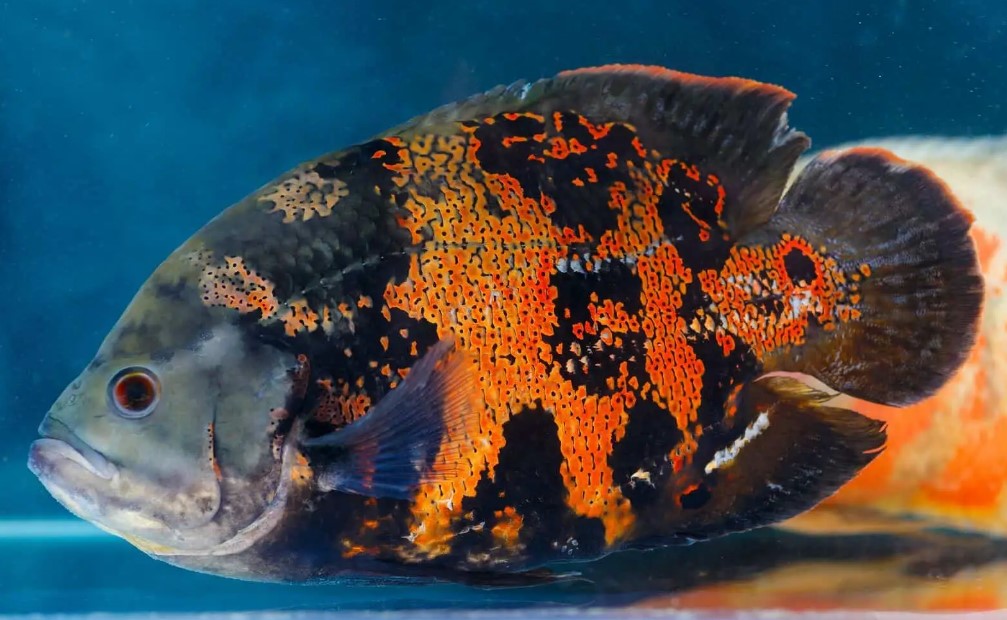The Basics
In freshwater aquariums, the oscar fish (or simply oscar) is a species from the cichlid family. Oscars originate from South America – namely the Amazon River basin – but have been introduced all over the world. There are many types of Oscar fish available as aquarium species.
A common variety is the “tiger oscar,” which is very similar to the wild oscar fish. Xanthistic (yellowish) varieties are also available, as well as albino (mostly white) varieties. It is still the Astronotus ocellatus species that sells these varieties under a variety of trade names.
A large number of smaller organisms, including catfish, crustaceans, and aquatic insect larvae, are fed on by Oscars in the wild. It is common for oscars to create suction by rapidly expanding their mouths in order to capture prey.
They do well on most diets intended for large carnivorous fish in captivity, though they have a special requirement for vitamin C, which they sometimes obtain from eating fallen fruits.
Although native to South America, the oscar has been introduced to rivers around the world due to its popularity as an aquarium species. In China, some oscars have been spotted in the wild! Introducing large predators into an ecosystem can pose challenges for native organisms that have not adapted to them.
Interesting Insights from the Oscar Fish!
Although the Oscar is a common aquarium fish, many owners do not realize the amazing biological concepts this fish displays. These concepts are perfectly exemplified by the Oscar!
Suction Feeding
Take a deep breath. What about that apple sitting three feet away? Did you suck it up? The Oscar fish, on the other hand, eats exactly that way!
As with many predatory fish, Oscar fish take advantage of the viscosity of water. Water is much denser than air, which can move freely around objects. Additionally, water molecules pull on one another through cohesion. Oscars suck in massive amounts of water when they open their mouths quickly.
It is impossible for smaller fish to escape the Oscar’s mouth when they are caught in a wave. Fish are not the only aquatic organisms that use suction feeding. Sharks, newts, catfish, among others, are notable suction feeders. A suction feeder is typically an “ambush predator” – waiting carefully for its prey to come close enough to catch it in its vortex.
Invasive Aquarium Fish
A variety of fish have expanded their range since being commonly kept in aquariums, including the oscar fish. Many invasive species have been introduced into natural habitats around the world by the aquarium industry.
The environmental impact of releasing oscar fish has not yet been fully studied, but other aquarium species are causing havoc on natural habitats.
Saltwater aquariums commonly keep Zebrafish, for example. Observing the fish in captivity is very interesting, as the fish are beautiful and colorful. Because of this, the fish was imported from the Indian Ocean to the United States.
There were, however, a few Zebrafish that accidentally made their way into the Gulf of Mexico. Zebrafish have become a massively destructive species along many Gulf reefs only a few decades later.
Zebrafish are voracious predators and have a number of protective spines, so they can eat almost anything and do not have any natural predators in the Gulf of Mexico. Therefore, Zebrafish populations have exploded and are rapidly reducing coral reef fish species.
This invasive species has been partly blamed for the loss of corals from South America to Florida because it is so destructive.
Brood Care
In addition to being a voracious predator, the Oscar can also be a very protective parent. Their large mouths can swallow anything small enough to fit in, chasing off all other fish that come too close to their territory!
Oscars, however, are very careful when it comes to their babies. As a matter of fact, the Oscar fish protects its babies and takes great care not to suck them up. A type of parental care known as “brood care” is observed in several fish species. When most fish release their eggs into the environment, the oscar protects its offspring until they are large enough to leave and establish their own territory.

